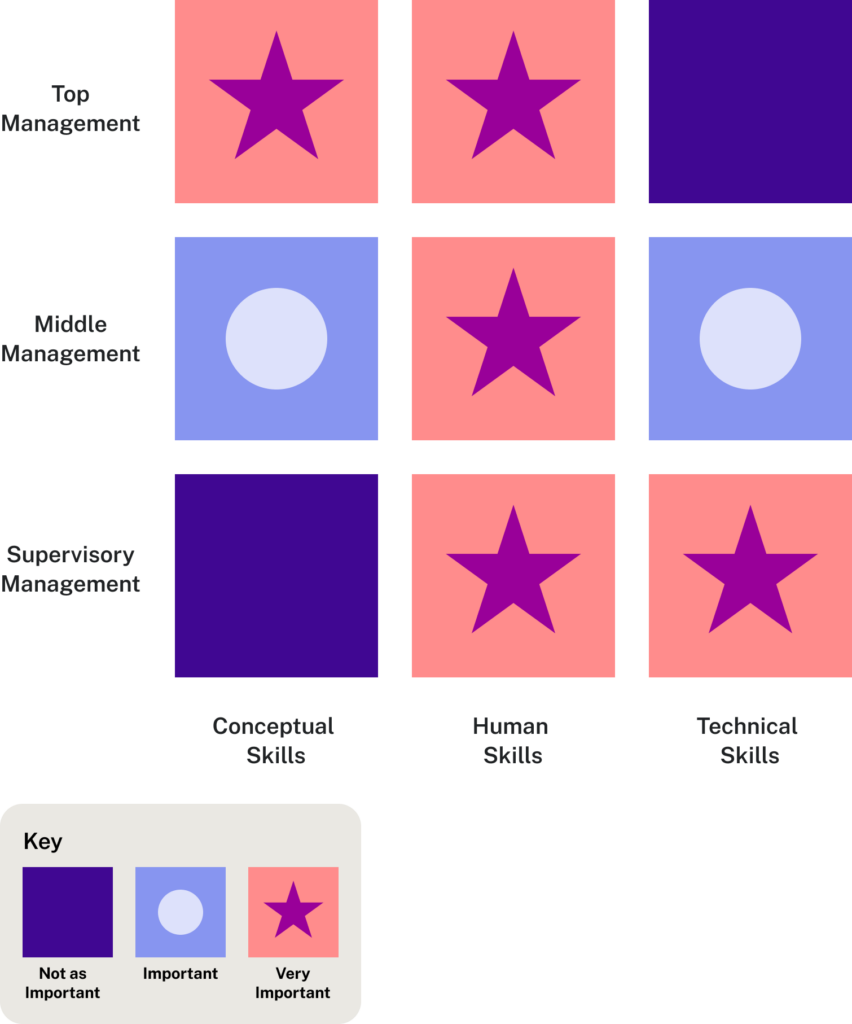Managerial Skills
The skills needed to succeed at each level of management vary somewhat, but there are certain skills common to all. Robert Katz, an American social and organizational psychologist, is credited with articulating the concept of management skill sets. He identified three critical skill sets for successful management professionals: technical skills, conceptual skills, and human skills. While these three broad skill categories encompass a wide spectrum of capabilities, each category represents a useful way of highlighting the key capabilities and their impact on management at different levels.

Technical Skills
Of the three skill sets identified by Katz, technical skills are the broadest, most easily defined category. A technical skill is defined as a learned capacity in just about any given field of work, study, or even play. For example, a soccer player must learn how to pass and receive the ball—both are technical skills. A mechanic, meanwhile, needs to be able to take apart and rebuild an engine, operate various machinery (lifts, computer-scanning equipment, etc.), and know how to install a muffler, for example.
Managers also need a broad range of technical abilities. Front-line managers, in particular, often need to use technical skills on a daily basis. They need to communicate up the chain of command while still speaking the language of the workers who are executing the hands-on aspects of the industry. A technical skill for a front-line manager might include a working understanding of a piece of equipment. The manager must be able to coach the employee on its operation, but also be able to explain the basic functions of the machinery to upper managers. Managers in other corporate roles and at higher levels also require technical skills. These can include office-based competencies such as programming, writing, giving presentations, and using applications such as Zoom for video conferencing.
Conceptual Skills
Conceptual skills are also crucial to managerial success. Conceptual skills enable one to generate ideas creatively and intuitively and also show comprehensive understanding of contexts or topics. Conceptual skills tend to be most relevant to upper-level thinking and broad strategic situations (as opposed to lower-level and line management). As a result, conceptual skills are often viewed as critical success factors for upper-managerial functions.
The key to this type of skill is conceptual thinking. Although conceptual thinking is difficult to define, it is generally considered to be the ability to formulate ideas or mental abstractions. When combined with information and creativity, conceptual thinking can result in new ideas, unique strategies, and innovative solutions. While all levels of management benefit from conceptual thinking, upper management spends the most time with this mindset, since it is largely tasked with identifying and drafting a strategy for the broader operational and competitive approach of an organization. Because this kind of strategic planning includes generating organizational values, policies, mission statements, ethics, procedures, and objectives, upper managers need to possess strong conceptual skills.
While upper management may use the conceptual skill set most, middle managers and front-line managers must also both understand and participate in the company objectives and values. Of particular importance is the ability to communicate these critical concepts to subordinates and decide which information to convey to upper management. Tracking and collecting the results of conceptual thinking are parts of a feedback loop. Conceptual skills are important in empowering managers in all levels of an organization to observe the operations of an organization and frame them conceptually as an aspect of that organization’s strategy, objectives, and policies. Conceptual thinking allows for accurate and timely feedback and organizational adaptability.
Human Skills
The development of human skills—a combination of social, interpersonal, and leadership skills—is central to the success of any manager. Over the years, the conventional definition of management has become less specific, as managerial functions can include staffing, directing, and reporting.
Modern companies have fewer layers of management, as these companies now tend to delegate (rather than concentrate) responsibilities and authority to achieve goals. As a result, businesses often expect managers to lead or guide people, rather than giving out instructions for every action or task. The ability to lead people is therefore a central component of human skills.
Realistically, most organizations need managers who can view their teams analytically and objectively, evaluate inefficiencies, and make unpopular choices. However, it’s misguided to think that a manager has to be distant from or disliked by subordinates to execute these responsibilities. Creating a healthy work environment that’s conducive to development, constructive criticism, and achievement simply requires strong human skills—especially in the realm of communication.
Good managers understand not only what they are trying to say but also the broader context and implications of saying it. A sender communicating a message to a receiver is not simply transmitting factual information. Other dimensions of the exchange are just as important: empathy, self-reflection, situational awareness, and charisma all play integral roles in communicating effectively and positively.
Using Your Skills
The degree to which each type of skill is used depends upon the level of the manager’s position as seen in the illustration above. Additionally, in an increasingly global marketplace, it pays for managers to develop a special set of skills to deal with global management issues.
In sum, technical, conceptual, and human skills are all needed to be an effective manager. As a manager moves up the organizational ladder, they may find that success requires fewer or different technical skills and a heavier reliance on interpersonal and human skills.